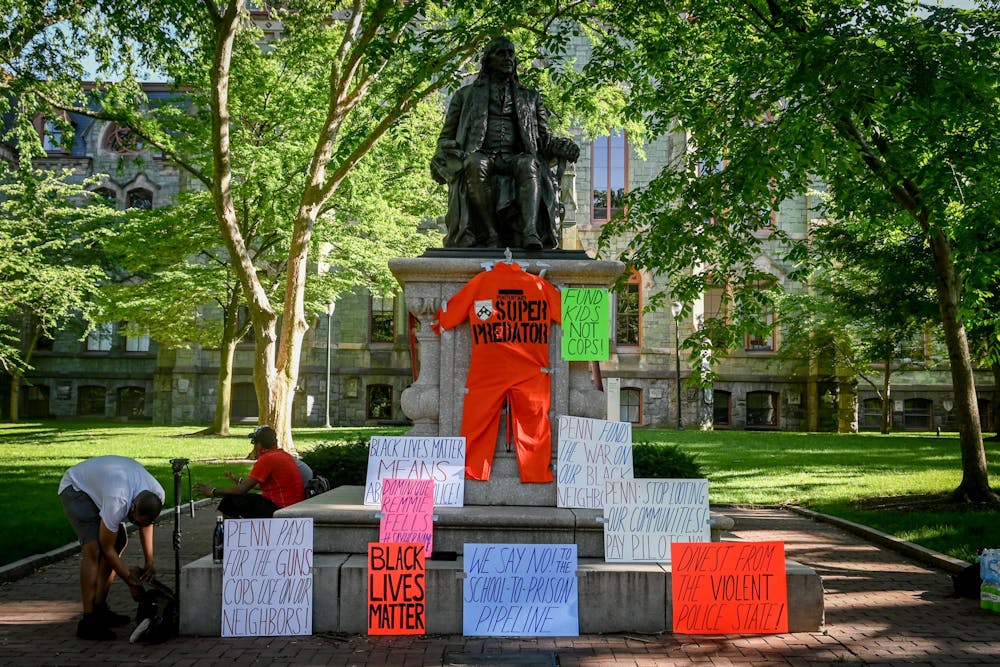Although Penn announced a $100 million contribution to the School District of Philadelphia, the University did not pay Payments in Lieu of Taxes, financial contributions that property tax-exempt organizations voluntarily make to local governments, this year. While students have been calling on Penn to pay PILOTs for decades, demands were reignited by the Black Lives Matter movement and protests against systemic racism this summer.
Universities do not have to pay property taxes to their respective local governments, despite owning large amounts of land, forcing local governments to make up for the lost tax revenue. Despite this, Penn and Columbia University are the only Ivy League universities that do not have PILOT agreements with their local governments.
Students and faculty have petitioned Penn to make the payments, citing that the city, and particularly its public schools, are facing especially dire financial losses this year due to the pandemic.

On Nov. 17, Penn announced that it will contribute $100 million to the School District of Philadelphia over the next 10 years.
May 27 — Penn Democrats and Penn Student Power joined a coalition with other Philadelphia-based organizers to urge the University and other large nonprofit institutions to pay PILOTs. The coalition also includes Penn Law students conducting research for the project, members of local nonprofits, local teachers, and parents.
Philadelphia Jobs with Justice, a coalition fighting for the fair treatment of working people, Penn Dems, and Penn Student Power, also hosted a virtual speak-out about the social and financial impacts of the COVID-19 pandemic on Philadelphia’s public schools on May 5.
June 14 — More than 730 faculty and staff signed a petition calling on the University to pay PILOTs. The campaign, Penn for PILOTs, marked the first united effort by Penn faculty and staff demanding the University make payments to the city
The petition, which now has more than 1,100 signatures, called on Penn to pay 40% of what the University would pay in property taxes in a given year. Under Penn for PILOTs' proposal, the University's payments would fund Philadelphia's public schools through an Educational Equity Fund governed by the city and the School District of Philadelphia.
RELATED:
Penn Dems phone banks ahead of January runoff to flip Georgia Senate seats
Penn Dems hosts virtual meet-and-greet with grad and one of youngest Pa. Reps Jennifer O'Mara
After receiving no response from administration, 68 faculty and staff members sent individual follow-up emails to the Board of Trustees in July asking to meet with them to discuss their refusal to pay PILOTs.
July 24 — Over 100 Penn students and Philadelphia community members gathered outside the Penn Police Department headquarters to protest Penn Police’s alleged involvement in tear-gassing protesters in May. Protesters wore masks and held signs that listed three demands: fire Vice President for Public Safety and President of the Philadelphia Police Foundation Maureen Rush, defund the Penn Police Department, and pay PILOTs.

Protesters held banners listing their demands in front of the Penn Police Department headquarters.
Sept. 22 — Penn professors held an open press conference to publicly demand the University reverse its refusal to pay PILOTs ahead of the Sept. 24 Board of Trustees meeting. Following months of silence from the Board of Trustees after delivering its petition and individual letters, Penn for PILOTs called on the Trustees to start an open dialogue about paying PILOTs.
Oct. 8 — Second-term Philadelphia Councilmember and 1993 College graduate Helen Gym urged the University to pay PILOTs in an interview with The Daily Pennsylvanian. Gym ran for office in 2015 on a Penn-centric platform, agreeing to work with the city’s largest nonprofits to increase the revenue Philadelphia receives from PILOTs.
While she said Penn has made great contributions to Philadelphia, she thinks the University has an unfinished role in uplifting one of the poorest cities in the country.
“The fundamental issue is that property taxes are the bread and butter of school funding, and the unjust and unconstitutional lack of funding for our public schools is a key reason why so much inequity exists across our city," Gym said. "Philadelphia’s greatest nonprofit actors — many of which don’t pay property taxes — cannot be silent on this issue, and indeed should be proactive on this at every level."

Helen Gym (center) speaking during a Count Every Vote protest in front of the Pennsylvania Convention Center on Nov. 6.
Oct. 11 — The Record, Penn's official undergraduate yearbook, announced plans to donate a percentage of its profits from 2021 yearbooks sales to the School District of Philadelphia in response to Penn’s refusal to pay PILOTs.
While the exact donation amount is currently undecided, the donation will be made to The Fund for the School District of Philadelphia, a nonprofit that serves as an intermediary between donors and the district.
Nov. 17 — Penn pledged to contribute $100 million to the School District of Philadelphia over the next 10 years, the largest private contribution in the school district’s history. The University plans to contribute $10 million annually over the next decade to address environmental hazards in Philadelphia’s public schools, such as lead and asbestos.
Students and faculty say the payment is not a PILOT, criticizing its short-term commitment as well as Penn's framing of the contribution as a gift rather than a debt owed to the city.
Members of the Penn community continue to support Penn for PILOTs' demands that the University pay 40% of what it would owe in property taxes, which is almost four times the amount Penn has pledged to give annually, and continue contributing to the city well beyond the 10-year period.









